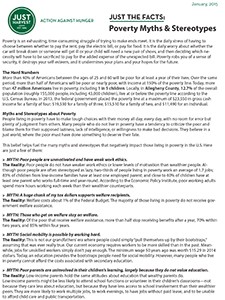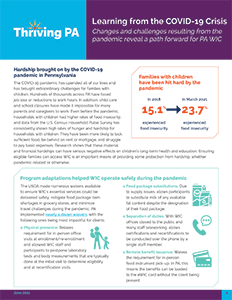 Research shows that material and financial hardships can have serious negative effects on children’s long-term health and education. Ensuring eligible families can access WIC is an important means of providing some protection from hardship, whether pandemic-related or otherwise.
Research shows that material and financial hardships can have serious negative effects on children’s long-term health and education. Ensuring eligible families can access WIC is an important means of providing some protection from hardship, whether pandemic-related or otherwise.
Publication Types Archives: Fact Sheets
Stopping WIC’s Downward Spiral
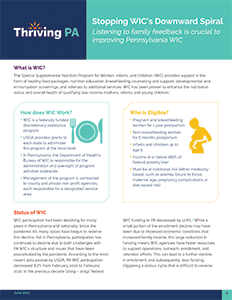 WIC participation had been declining for many years in Pennsylvania and nationally. Since the pandemic hit, many states have begun to reverse this decline. Yet in Pennsylvania, participation has continued to decline due to both challenges with PA WIC’s structure and issues that have been exacerbated by the pandemic.
WIC participation had been declining for many years in Pennsylvania and nationally. Since the pandemic hit, many states have begun to reverse this decline. Yet in Pennsylvania, participation has continued to decline due to both challenges with PA WIC’s structure and issues that have been exacerbated by the pandemic.
Raising the Minimum Wage
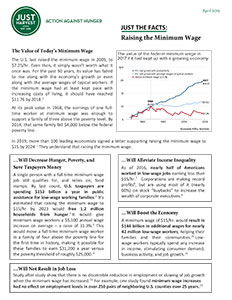 Over the past 50 years, the value of the minimum wage has generally decreased due to cost of living increases. If it had kept pace with inflation, it would currently be $11.76 by 2018. But it should actually be much higher.
Over the past 50 years, the value of the minimum wage has generally decreased due to cost of living increases. If it had kept pace with inflation, it would currently be $11.76 by 2018. But it should actually be much higher.
Hunger in Allegheny County
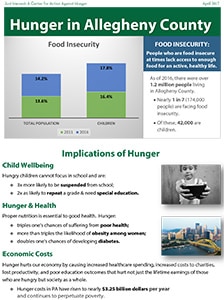 Food insecurity; the implications of hunger for child well-being, health, and the economy; and federal nutrition programs enrollment statistics for Allegheny County and Pennsylvania.
Food insecurity; the implications of hunger for child well-being, health, and the economy; and federal nutrition programs enrollment statistics for Allegheny County and Pennsylvania.
The Value of Low-income Tax Credits
 Low-Income Families Rely on Tax Credits
Low-Income Families Rely on Tax Credits
The Earned Income Tax Credit (EITC) is one of the nation’s largest anti-poverty programs, and can increase a family’s annual income by as much as 45 percent. The EITC and the Child Tax Credit (CTC) are among the nation’s strongest tools to help working families escape poverty and achieve greater self-sufficiency.
Read why low-income tax credits must be protected and meet some of the people right here in Allegheny County who benefit from them.
Poverty Myths and Stereotypes
- The Hard Numbers
- Myths and Stereotypes About People Living in Poverty
- How You Can Help
Pennsylvania House Bill 222: Banning Former Drug Felons from Basic Assistance Benefits
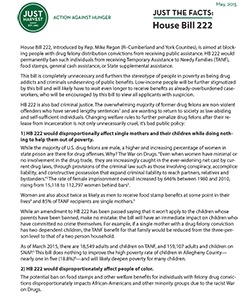 House Bill 222, introduced by Rep. Mike Regan (R–Cumberland and York Counties), is aimed at blocking people with drug felony distribution convictions from receiving public assistance. HB 222 seeks to ban such individuals from receiving Temporary Assistance to Needy Families (TANF), food stamps, general cash assistance, or State supplemental assistance.
House Bill 222, introduced by Rep. Mike Regan (R–Cumberland and York Counties), is aimed at blocking people with drug felony distribution convictions from receiving public assistance. HB 222 seeks to ban such individuals from receiving Temporary Assistance to Needy Families (TANF), food stamps, general cash assistance, or State supplemental assistance.
Community Eligibility Provision
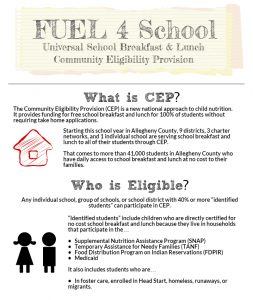 The Community Eligibility Provision (CEP) is a new national approach to child nutrition. It provides funding for free school breakfast and lunch for 100% of students without requiring take home applications.
The Community Eligibility Provision (CEP) is a new national approach to child nutrition. It provides funding for free school breakfast and lunch for 100% of students without requiring take home applications.
Starting this school year in Allegheny County, 9 districts, 3 charter networks, and 1 individual school are serving school breakfast and lunch to all of their students through CEP.
Pennsylvania must increase the TANF Earned Income Disregard
 Currently, when families who are receiving TANF obtain employment, Pennsylvania disregards 50% of their earnings when determining their benefit level – the Earned Income Disregard. This helps families make a smoother transition into self-sufficiency while continuing to provide much needed assistance to the family.
Currently, when families who are receiving TANF obtain employment, Pennsylvania disregards 50% of their earnings when determining their benefit level – the Earned Income Disregard. This helps families make a smoother transition into self-sufficiency while continuing to provide much needed assistance to the family.
Pennsylvania must raise the TANF cash grants
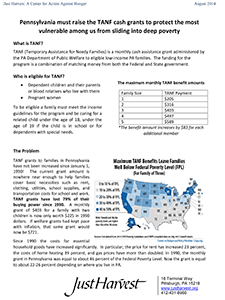 TANF (Temporary Assistance for Needy Families) is a monthly cash assistance grant administered by the PA Department of Public Welfare to eligible low-income PA families. The funding for the program is a combination of matching money from both the Federal and State government. Pennsylvania must raise the TANF cash grants to protect the most vulnerable among us from sliding into deep poverty.
TANF (Temporary Assistance for Needy Families) is a monthly cash assistance grant administered by the PA Department of Public Welfare to eligible low-income PA families. The funding for the program is a combination of matching money from both the Federal and State government. Pennsylvania must raise the TANF cash grants to protect the most vulnerable among us from sliding into deep poverty.

